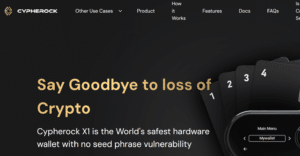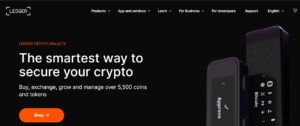Best Crypto Wallets in Ireland 2025
Profile

Co-Founder
Thomas brings extensive experience in financial analysis and investment research. With a strong background in both institutional and retail investment sectors, Thomas ensures all content meets the highest standards of accuracy and relevance.
Follow on Twitter"Every piece of investment advice should be grounded in solid research and practical application. My role is to ensure our content provides real value to investors at every level."
My Favourite Writes:
Profile

Co-Founder
Dom is an experienced retail investor, learning his craft in what he likes to call the "hard way". Through many of these lessons he has crafted himself a sound investment strategy that has enabled him to make investing into a business not just a hobby.
Follow on Twitter"Financial clarity and integrity are the cornerstones of everything we do. We're here to ensure that your investment journey is built on a solid financial understanding and a sound strategic foundation."
My Favourite Writes:
Profile

Co-Founder
Adam is a passionate investor who created The Investors Centre (TIC) to combine his professional skills with his love for investment.
Follow on Twitter"Investment is about more than just numbers; it's about strategy, research, and the willingness to adapt."
My Favourite Writes:
How We Test
Our Commitment to Accuracy
At The Investors Centre, we maintain the highest standards of accuracy and reliability in all our investment education content. Every article undergoes rigorous fact-checking and review processes.
Our Testing & Verification Process
- Primary Research: We gather data directly from official sources including company reports, regulatory filings, and government databases.
- Platform Testing: Our team personally tests and evaluates investment platforms, creating accounts and documenting real user experiences.
- Expert Analysis: Content is reviewed by experienced investors and financial professionals within our team.
- Data Verification: All statistics, figures, and claims are cross-referenced with multiple authoritative sources.
- Regular Updates: We review and update content quarterly to ensure information remains current and accurate.
Review Standards
- Independence: We maintain editorial independence and disclose any potential conflicts of interest.
- Transparency: Our testing methodology and evaluation criteria are clearly documented.
- Objectivity: Reviews are based on measurable criteria and standardized testing procedures.
Corrections Policy
If errors are identified, we correct them promptly and note significant updates at the bottom of articles. Readers can report inaccuracies to our editorial team at info@theinvestorscentre.co.uk
Last Review Date
This article was last fact-checked and updated on: October 23, 2025
Disclaimer
Educational Purpose Only
All content on The Investors Centre is provided for educational and informational purposes only. It should not be construed as personalised investment advice, financial advice, or a recommendation to buy, sell, or hold any investment or security.
No Financial Advice
We are not authorised by the Financial Conduct Authority (FCA) to provide investment advice. Content on this website does not constitute financial advice, and you should not rely on it as such. Always consult with a qualified financial advisor or professional before making investment decisions.
Investment Risks
Investing carries inherent risks, including the potential loss of principal. Past performance does not guarantee future results. The value of investments can go down as well as up, and you may not get back the amount originally invested.
Accuracy & Completeness
While we strive to provide accurate and up-to-date information, we make no representations or warranties of any kind, express or implied, about the completeness, accuracy, reliability, suitability, or availability of the information contained on this website.
Third-Party Content & Links
This website may contain links to third-party websites and references to third-party products or services. We do not endorse, control, or assume responsibility for any third-party content, privacy policies, or practices. Users access third-party sites at their own risk.
Affiliate Disclosure
Some links on this site may be affiliate links. If you click on these links and make a purchase or sign up for a service, we may receive a commission at no additional cost to you. This does not influence our editorial content or reviews.
Personal Responsibility
Any action you take upon the information on this website is strictly at your own risk. We will not be liable for any losses or damages in connection with the use of our website or the information provided.
Regulatory Notice
Investment products and services featured on this website may not be available in all jurisdictions or to all persons. Users are responsible for complying with local laws and regulations.
Contact Information
For questions about this disclaimer or our content, please contact:
Email: info@theinvestorscentre.co.uk
Last Updated
This disclaimer was last updated on: August 2025
Discover the best crypto wallets for secure storage of your digital assets. Each wallet has been rigorously tested and is fully accessible to traders in Ireland.

eToro Money Wallet
IE Wallet Score: 4.3/5
Investing in crypto carries a high level of risk.

Coinbase Wallet
IE Wallet Score: 4.2/5
Investing in crypto carries a high level of risk.

Best Wallet
IE Wallet Score: 4.2/5
Investing in crypto carries a high level of risk.

Trezor Model T
IE Wallet Score: 4/5
Investing in crypto carries a high level of risk.

Ledger Nano S Plus
IE Wallet Score: 4/5
Investing in crypto carries a high level of risk.

Cypherock X1
IE Wallet Score: 4/5
Investing in crypto carries a high level of risk.
Quick Answer: Which Wallet is the Best?
eToro Money Wallet stands out as the best crypto wallet for Irish users. With its user-friendly interface, robust security features, and integrated trading platform, it supports a wide range of cryptocurrencies. Seamless transactions and advanced portfolio management tools make it ideal for both beginners and experienced investors.
How Do These Wallets Compare?
| Wallet | Price Range (Approx. £) | Wallet Type | Compatibility | Exchange Integration | No. of Supported Coins |
|---|---|---|---|---|---|
| eToro Money Wallet | Free | Hot | iOS, Android | eToro platform only | 120+ |
| Coinbase Wallet | Free | Hot | iOS, Android, Browser Extension | Coinbase | 100+ |
| Trezor Model T | £200-£220 | Cold | Windows, Mac, Linux, Android | No direct, integrates with 3rd-party (e.g., Exodus) | 1,800+ |
| Best Wallet | Free | Hot | iOS, Android | Best DEX (decentralized exchange) | 60+ chains |
| Cypherock X1 | £150-£170 | Cold | Windows, Mac, Linux | No | 1,000+ |
| Ledger Nano S Plus | £70-£90 | Cold | Windows, Mac, Linux, iOS, Android (via OTG) | No direct, integrates with Ledger Live | 5,500+ |
| MetaMask | Free | Hot | iOS, Android, Browser Extension | Yes, through Web3 and DeFi platforms | Ethereum and EVM-compatible chains |
Top 7 Best Crypto Wallets in Ireland
- eToro Money Wallet – Best Overall: User-friendly, multi-asset support, secure for beginners (hot).
- Coinbase Wallet – Easy to use, strong integration with Coinbase (hot).
- Best Wallet – Best Mobile Application for Crypto Management (Hot)
- Trezor Model T – The Best Cold Wallet Overall: Open-source, highly secure (cold).
- Cypherock X1 – Unique hardware wallet with multi-factor security, no single point of failure (cold).
- Ledger Nano S Plus – Best budget cold wallet, great price for features (cold).
- MetaMask – Ideal for Ethereum and Web3 users, user-friendly, supports DeFi (hot).
Pros & Cons
- Easy integration with eToro trading platform
- Multi-crypto support
- Private key recovery service
- High transaction fees for certain transfers
- No full control over private keys
- Limited to eToro users
-
History
-
Security Incidents
-
Models Available
eToro was founded in 2007 as a fintech company aiming to democratize trading. Initially focused on forex trading, the platform rapidly expanded into commodities, stocks, and cryptocurrencies. In 2018, eToro launched its dedicated crypto wallet, eToro Money, to provide users with a secure, user-friendly way to store and manage digital assets. Since then, eToro has evolved into a global leader in social trading and cryptocurrency management, with millions of users worldwide.
The eToro Money Wallet is a hot wallet, available on both iOS and Android devices. It supports multiple cryptocurrencies, including Bitcoin (BTC), Ethereum (ETH), and Litecoin (LTC), with new assets added regularly.
Key Features:
- Seamless integration with the eToro trading platform for easy transfers.
- Built-in security measures such as two-factor authentication (2FA).
- Private key recovery services, providing users with an additional safety net.
However, as a hot wallet, eToro Money is connected to the internet, which prioritizes convenience over the offline security offered by cold wallets. This wallet is ideal for Irish traders seeking ease of use and the security of a trusted financial platform.
Only 1 version, the eToro Money Wallet
Don’t invest unless you’re prepared to lose all the money you invest. This is a high-risk investment and you should not expect to be protected if something goes wrong. Take 2 mins to learn more.
Pros & Cons
- User-Friendly Interface
- Multi-Currency Support
- Strong Security Features
- Limited Advanced Features
- Dependence on Coinbase Exchange
- Transaction Fees
-
History
-
Security Incidents
-
Models Available
Launched in 2018, Coinbase Wallet was developed to offer users greater control over their private keys while expanding cryptocurrency management beyond the Coinbase exchange. Originally branded as Toshi, it was rebranded to align with Coinbase’s ecosystem. Over the years, Coinbase Wallet has focused on user experience and security, supporting a growing list of cryptocurrencies and tokens while integrating features like dApp interaction.
While Coinbase Wallet is known for strong security, it has faced typical challenges of the crypto space:
- Phishing Attacks (2021): Users were targeted by scams attempting to access private keys.
- Data Breach (2022): A vulnerability in Coinbase’s broader system impacted a small number of users, though the wallet itself remained secure.
Coinbase continues to improve its security measures, including educational initiatives to help users protect their assets and better safeguard private keys.
Coinbase Wallet is a non-custodial wallet, giving users full control of their private keys and funds. Available as a mobile app for iOS and Android, it supports a wide range of assets like Bitcoin, Ethereum, Litecoin, and ERC-20 tokens.
Key Features:
- Integration with decentralized applications (dApps), enabling direct interaction with blockchain services.
- Easy access to DeFi tools and decentralized exchanges for managing investments.
- Designed for on-the-go asset management, making it ideal for Irish investors exploring Web3 and DeFi opportunities.
Don’t invest unless you’re prepared to lose all the money you invest. This is a high-risk investment and you should not expect to be protected if something goes wrong. Take 2 mins to learn more.
Pros & Cons
- Mobile-focused
- Multi-chain support
- Integrated DEX
- Limited desktop functionality
- Ongoing development
- New to market
-
History
-
Security Incidents
-
Models Available
Best Wallet was launched with the goal of providing a comprehensive and secure solution for managing cryptocurrencies across multiple blockchains. With its focus on multi-chain support, an integrated decentralized exchange (DEX), and robust portfolio tools, it quickly gained attention as an all-in-one crypto management platform.
The wallet has expanded its features to include staking, airdrops, and portfolio tracking, with plans to introduce cross-chain swaps, derivatives trading, and enhanced security features in future updates.
Best Wallet takes security seriously, with no reported breaches to date. Its non-custodial nature ensures that users retain full control of their private keys, reducing the risk of centralized attacks.
Security Features:
- Biometric authentication, including Face ID and Touch ID, for added protection.
- Regular security updates to address vulnerabilities and enhance user safety.
Users are advised to follow best practices for private key management to ensure their funds remain secure.
Currently, Best Wallet is available as a mobile app for iOS and Android devices.
Key Features:
- Hot Wallet Functionality: Enables real-time transactions and management across multiple blockchains.
- Integrated DEX: Facilitates seamless in-app trading for a hassle-free experience.
Although there is no desktop or hardware wallet option available yet, future updates may include expanded functionality.
Don’t invest unless you’re prepared to lose all the money you invest. This is a high-risk investment and you should not expect to be protected if something goes wrong. Take 2 mins to learn more.
Pros & Cons
- Enhanced Security
- User-Friendly Interface
- Wide Cryptocurrency Support
- More expensive than software wallets
- Physical Device Risks
- Dependence on Physical Access
-
History
-
Security Incidents
-
Models Available
Trezor was founded in 2013 by SatoshiLabs in the Czech Republic as one of the first hardware wallets for secure cryptocurrency storage.
- 2014: Launched the Trezor One, a pioneer in secure and user-friendly offline storage.
- 2018: Introduced the Trezor Model T, an advanced version with a touchscreen and expanded cryptocurrency support.
- 2023: Released the Trezor Safe 3 (TS3), featuring enhanced security with a tamper-proof chip.
Trezor continues to improve its wallets with regular firmware updates, ensuring top-notch security and functionality.
While Trezor has built a strong reputation for security, a few challenges have emerged over the years:
- 2017: Vulnerabilities in the Trezor One allowed private key extraction through physical access, mitigated with a firmware update.
- 2019: A firmware issue was quickly resolved to prevent private key exposure, with no evidence of exploitation.
- Phishing Attacks: Users have been targeted by phishing attempts, exploiting social engineering rather than hardware flaws.
- Supply Chain Risks: Addressed with tamper-evident packaging to prevent hardware tampering before delivery.
Trezor continues to improve its products, educating users to avoid phishing and encouraging the use of tamper-proof wallets.
- Trezor Model One (2014):
- Entry-level cold wallet for Bitcoin, Ethereum, and ERC-20 tokens.
- Price: ~€80.
- Trezor Model T (2018):
- Advanced cold wallet with a touchscreen interface and support for over 8,000 cryptocurrencies.
- Price: ~€219.
- Trezor Safe 3 (TS3) (2023):
- Features a tamper-proof secure element chip and supports standard and Shamir backups.
- Available in four colors: Solar Gold, Cosmic Black, Galactic Rose, Stellar Silver.
- Price: ~€79.
Don’t invest unless you’re prepared to lose all the money you invest. This is a high-risk investment and you should not expect to be protected if something goes wrong. Take 2 mins to learn more.
Pros & Cons
- Multi-layered seed generation
- Seed stored off-device
- Support for 3,000+ altcoins
- Limited interoperability
- Small screen size
- No microSD backup
-
History
-
Security Incidents
-
Models Available
Cypherock X1 was founded in 2019 in Delhi, India, with a mission to empower individuals to have full sovereignty over their cryptocurrency and personal data.
Key Milestones:
- Introduced the Cypherock X1 hardware wallet, designed to enhance security by avoiding the typical single point of failure in private key storage.
- Leveraged Shamir Secret Sharing and EAL 6+ Smart Cards to provide robust, distributed storage for blockchain assets.
- Developed with a focus on accessibility, security, and a user-first approach.
Cypherock X1 has a strong security record with no documented incidents or vulnerabilities to date.
Notable Features:
- Shamir Secret Sharing: Breaks private keys into multiple shards, ensuring they are never stored in one place.
- Distributed Storage: Prevents private key compromise by avoiding storage on a single device.
- EAL 6+ Smart Cards: Industry-grade secure chips for an extra layer of security.
User Caution: While Cypherock X1 has no reported breaches, users are encouraged to follow best practices for security, such as safe key management and regular firmware updates, as the digital asset security landscape evolves.
Cypherock offers a single model: Cypherock X1.
Key Features:
- Designed for cold storage of cryptocurrencies with distributed key management.
- Compatible with over 3,000 altcoins, making it ideal for diverse portfolios.
- Includes multi-factor authentication for enhanced security.
Drawbacks:
- No dedicated desktop app or multisig functionality, which might limit usability for advanced users.
Don’t invest unless you’re prepared to lose all the money you invest. This is a high-risk investment and you should not expect to be protected if something goes wrong. Take 2 mins to learn more.
Pros & Cons
- Affordable
- High security
- Wide asset support
- Limited storage
- No Bluetooth
- No battery
-
History
-
Security Incidents
-
Models Available
Founded in 2014 in France, Ledger is a pioneer in cryptocurrency security, known for its robust hardware wallets. Its flagship products, the Ledger Nano series, have become synonymous with secure cold storage in the crypto community.
Key Milestones:
- 2014: Launched the first Ledger Nano wallet, setting a new standard in crypto asset security.
- 2022: Released the Ledger Nano S Plus, a budget-friendly option with expanded features for modern crypto investors.
Ledger continues to innovate, providing trusted security solutions for millions of users worldwide.
Despite its strong reputation, Ledger has faced notable security challenges:
- Connect Kit Exploit (2023): A phishing attack exploited the Connect Kit software, leading to unauthorized asset redirection and a loss of €445,000. Ledger has since enhanced its code review policies, improved employee security training, and strengthened infrastructure monitoring.
- Customer Data Leak (2020): Personal information for 273,000 customers was exposed and later made public. While no wallet breaches occurred, the incident highlighted the importance of protecting personal data. Ledger responded by improving privacy policies and data storage practices.
- Ledger Nano S Plus:
- Supports over 5,500 cryptocurrencies.
- USB-C dependent, stores up to 100 apps, but lacks Bluetooth connectivity.
- Priced at approximately €80–€100, making it a budget-friendly option.
- Ledger Nano X:
- Premium model with Bluetooth support, compatible with Web3 wallets like MetaMask.
- Supports over 5,000 cryptocurrencies and stores up to 100 apps.
- Ideal for those needing wireless connectivity and portability.
Don’t invest unless you’re prepared to lose all the money you invest. This is a high-risk investment and you should not expect to be protected if something goes wrong. Take 2 mins to learn more.
Pros & Cons
- Perfect for Ethereum and Web3
- Flexible access
- Free to use
- Limited compatibility
- Hot wallet vulnerabilities
- No built-in 2FA
-
History
-
Security Incidents
-
Models Available
MetaMask was developed by ConsenSys to simplify access to the Ethereum blockchain and foster interaction with decentralized applications (dApps).
Key Milestones:
- Launch: Created as a browser extension to support Ethereum token management and blockchain transactions.
- Expansion: Introduced mobile apps and features like in-wallet token swapping to improve functionality and user convenience.
- Commitment to Security: Regular updates and improvements showcase MetaMask’s dedication to secure and user-friendly cryptocurrency management.
MetaMask has grown to become one of the most trusted and widely-used wallets for Ethereum enthusiasts globally.
Although MetaMask maintains a solid reputation for security, users have faced challenges related to phishing attacks:
- Phishing Threats: Counterfeit websites and fake browser extensions impersonating MetaMask have targeted users. These incidents highlight the importance of downloading the wallet from official sources and staying vigilant during transactions.
Despite these threats, MetaMask’s strong encryption and frequent updates bolster its security measures, making it a reliable hot wallet for cryptocurrency enthusiasts.
MetaMask is available as both a browser extension and mobile app, making it highly versatile for users across Ireland:
- Browser Extension:
- Compatible with Chrome, Firefox, Brave, and Edge.
- Ideal for managing assets and interacting with dApps on desktop devices.
- Mobile App:
- Supports iOS and Android, enabling seamless asset management on the go.
- Hardware Wallet Integration:
- While MetaMask itself is not a hardware wallet, it can integrate with Ledger and Trezor, providing enhanced security by combining the flexibility of software with the protection of cold wallets.
Don’t invest unless you’re prepared to lose all the money you invest. This is a high-risk investment and you should not expect to be protected if something goes wrong. Take 2 mins to learn more.
Cold vs. Hot Crypto Wallets
Cold and Hot Wallets are the two primary types of cryptocurrency storage, each designed to cater to different needs based on security and accessibility. Here’s a detailed comparison tailored for Irish crypto users:
Cold Wallets
Cold wallets are offline storage solutions, disconnected from the internet to protect against hacking and cyber threats. They are ideal for long-term storage of large cryptocurrency holdings.
Common Types:
- Hardware Wallets: Devices like Ledger Nano X and Trezor Model T.
- Paper Wallets: Physically written private keys for offline storage.
Pros
- Enhanced Security: Being offline protects assets from online threats like hacking or phishing.
- Long-Term Holding: Ideal for securely storing large amounts of cryptocurrency without frequent access.
- Backup Options: Hardware wallets allow recovery through backup phrases, adding a safety net.
Cons
- Limited Accessibility: Requires a physical connection to access funds, making frequent transactions inconvenient.
- Cost: Specialized hardware wallets are more expensive, starting from around €70.
- Complex Setup: The initial setup can be intimidating for beginners.
Hot Wallets
Hot wallets are online storage solutions, connected to the internet for ease of use and quick transactions. They are popular for day-to-day trading and integration with decentralized finance (DeFi) and dApps.
Common Types:
- Software Wallets: Apps like MetaMask and Coinbase Wallet.
- Browser Extensions: Wallets integrated with browsers for instant Web3 access.
Pros:
- Convenience: Instant access to funds for quick transactions or daily use.
- DeFi & dApp Integration: Seamlessly connects with decentralized applications, enabling NFT trading, staking, and Web3 activities.
- Low Cost: Free or low-cost solutions, often downloadable as software.
Cons:
- Security Risks: Online connectivity increases vulnerability to hacking, phishing, and malware.
- Device Dependence: Relies on the security of the user’s device, adding risk.
- Unsuitable for Large Holdings: Best for smaller amounts due to higher long-term storage risks.
Cold vs. Hot Crypto Wallets
Cold Wallets:
Best for long-term investors who prioritize security and are holding large amounts of cryptocurrency.
Hot Wallets:
Ideal for active traders who need quick and frequent access to their funds, especially for DeFi, NFTs, and other Web3 applications.
Combined Approach:
For maximum security and flexibility, many Irish crypto investors adopt a hybrid strategy:
- Cold Wallets: Secure the bulk of your crypto assets for long-term holding.
- Hot Wallets: Keep smaller amounts for daily trading and quick access.
By understanding the strengths and weaknesses of both, you can choose the right combination to meet your specific cryptocurrency management needs.
How to Trade Using a Crypto Wallet
Trading with a crypto wallet can be straightforward when broken into simple steps. Here’s a step-by-step guide tailored for Irish crypto traders:
Step 1: Set Up Your Wallet
Begin by setting up your wallet.
- Hot Wallets: Download the app (e.g., MetaMask, Coinbase Wallet), create your account, and secure it with a strong password and two-factor authentication (2FA).
- Cold Wallets: Connect the hardware wallet (e.g., Ledger or Trezor) to your computer and follow the setup instructions.
- Important: Store your recovery phrase securely to recover your wallet if needed.
Step 2: Fund Your Wallet
Add cryptocurrency to your wallet.
- Transfer Funds: Move crypto from an exchange or another wallet. Double-check the wallet address to avoid irreversible errors.
- Test Transaction: Start with a small test transfer to ensure everything is working correctly.
Step 3: Choose Your Trading Platform
Decide whether to trade on a centralized exchange (e.g., Binance, Coinbase) or a decentralized exchange (DEX) (e.g., Uniswap).
- Hot Wallets: Many integrate seamlessly with DEXs for direct trading.
- Cold Wallets: Typically require connecting to an exchange platform as a security layer.
Step 4: Connect Your Wallet to the Platform
- DEX Users: Connect your wallet (e.g., MetaMask) directly to the exchange. This enables trading within the wallet interface.
- Centralized Exchanges: Transfer funds from your wallet to the exchange. Be aware of any transfer and trading fees.
Step 5: Select a Trading Pair
Choose the trading pair for your trade (e.g., BTC/ETH).
- Decide how much crypto to buy or sell.
- Review the market price, exchange rate, and fees before confirming the trade.
Step 6: Execute the Trade
Once satisfied with the trade details, execute the transaction.
- DEX Users: Your wallet will prompt you to approve the transaction. Keep some extra crypto in your wallet for gas fees.
- Centralized Exchanges: Follow the platform’s steps to complete the trade.
Step 7: Manage Your Assets
Post-trade, manage your crypto assets carefully.
- Hold or Reinvest: Decide whether to hold your assets, transfer them to another wallet, or reinvest in new trades.
- Security: Track transactions and ensure your wallet remains secure.
Step 8: Stay Informed
Crypto markets are volatile. Stay updated on trends and portfolio performance.
- Monitor Market Trends: Research market movements regularly to make informed decisions.
- Trade Responsibly: Never trade more than you can afford to lose.
Key Tips for Irish Traders
- Choose reputable wallets and exchanges compatible with Irish regulations.
- Factor in transaction costs like network fees and exchange charges before trading.
- Diversify your portfolio to reduce risks and explore emerging opportunities.
By following these steps, you can confidently trade using your crypto wallet while safeguarding your assets.
Conclusion
Trading with a crypto wallet is ideal for users seeking more security, privacy, and direct control over their assets. However, it requires technical knowledge and may involve higher costs and slower trades. For beginners or those prioritizing convenience, centralized exchanges may still be the better option. For the best results, many traders combine the strengths of both methods, using wallets for secure storage and exchanges for high-volume trades.

Get Up To $500
Worth In Free Assets
- New users only
- Choose from 6 select stocks & crypto
- Funds held 90 days
Terms apply. Your capital is at risk.
FAQs
Do I Need a Crypto Wallet to Buy Cryptocurrency in Ireland?
No, you don’t need a wallet to buy cryptocurrency. Most exchanges like eToro or Coinbase offer built-in wallets. However, a dedicated crypto wallet (hot or cold) gives you more control over your assets and enhances security.
Are Crypto Wallets Legal in Ireland?
Yes, using and owning crypto wallets is completely legal in Ireland. However, you must comply with tax regulations, as profits from cryptocurrency trades may be subject to Capital Gains Tax (CGT).
What’s the Difference Between Hot and Cold Wallets?
Hot wallets are online and ideal for frequent trading or accessing DeFi platforms. Cold wallets, like Ledger and Trezor, are offline and more secure, making them perfect for storing large amounts of cryptocurrency long-term.















